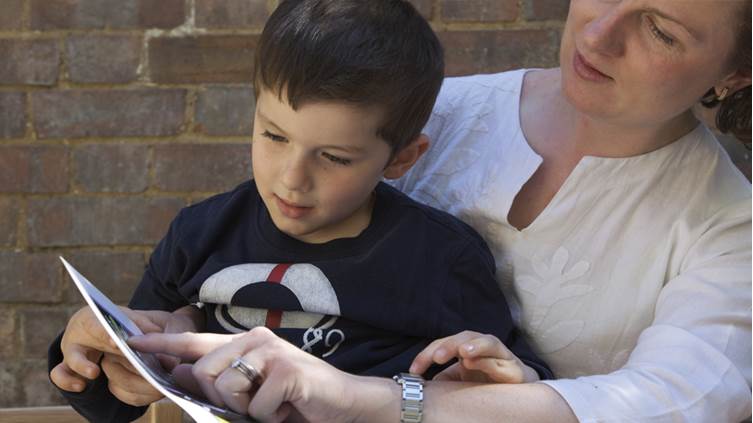Getting ready for school!
Published on: 05 August 2015 Author: Kay Devine
BookTrust regional manager for the south-east and east of England, Kay Devine, blogs about a whole-child approach to school readiness.

As September looms, it can be a difficult time for parents whose children will soon be starting 'Big School' aka Reception Class.
Parents and carers are often filled with mixed emotions – some know that their child is probably ready for the next step; some are equally sad that their little one is taking this big step, and some are confused about the words 'school readiness' which we see and hear everywhere.
What does 'school readiness' mean?
Parents and carers will have heard that children are 'tested' when they start school and often focus more upon the more academic development of their child prior to starting school. But, in his report 'State of the Nation Social Mobility and Child Poverty in Great Britain' (2014), Frank Field highlighted the essential skills that some children lack by the time they join the reception year:
- To sit still and listen.
- To be aware of other children.
- To understand the word no and the borders it sets for behaviour;
- To understand the word stop and that such a phrase might be used to prevent danger.
- To be potty trained and able to go to the toilet.
- To recognise their own name.
- To speak to an adult to ask for needs.
- To be able to take off their coat and put on shoes.
- To talk in sentences.
- To open and enjoy a book.
What this really means is that, as far as possible, children should develop good social and emotional skills appropriate to their age. Having these skills will help the children entering Reception be 'ready to learn' and to be comfortable in their surroundings.
All children attending any kind of Early Years setting will be supported in their development of these skills. It is important that parents and carers are clear that these skills are as vital as reading and writing skills for their child prior to starting school and that they can make a huge impact on how their children develop these skills.
Where is there support?
Many libraries will have books and resources around starting school. Essex Library Services have a 'Starting School Bag' - each book bag contains four specially chosen story and information books exploring what it's like to go to 'big' school.
The bag also has a survival guide for parents to help make a child's transition from pre-school to primary school stress-free and fun. Not all libraries will have specific bags but many will have 'starting school' booklists and other resources to support families.
Having good language skills when entering Reception Class is very important, as is having confidence to interact with adults and children in the new setting. Children need to be able to communicate their thoughts and feelings to those around them.
'A good quality home learning environment contributes more to children's intellectual and social development than parental occupation, education or income. Providing an enriched home learning environment enables children to build up important relationships with their parents, builds confidence and gives them the necessary building blocks for doing well in life. This is especially important when preparing children to start school ready to learn.'
(Department of Education, Sylva, K, The Effective Provision of pre-school (EPPE) project: findings from pre-school to end of KS1, 2004)
What can you do as a parent or carer?
As your child's first teacher, you can help to develop a strong home literacy environment – equipping your child with appropriate skills to start their school journey. Reading every day – even for 10 minutes – can also be vital in preparing children for school. Oxford University Press's "Books Beyond Bedtime" report (2013) states:
'Just 10 minutes of reading with your child each day is one of the best ways you can support your child's education.'
Reading aloud together can help a child grow into a confident learner and help them develop their language skills. Bedtime is the perfect time to catch 10 minutes of reading and whilst adults may groan at reading the same book 'again and again', doing so helps preschool children learn words which may be new to their vocabulary and consolidates their understanding of the words.
Kay's blog was originally featured on the PACEY website (Professional Association for Childcare and Early Years) and we thank them for letting us share it with you.
Topics: 2-3 years, 4-5 years, Early Years, Foundation (Wales), Features






Add a comment